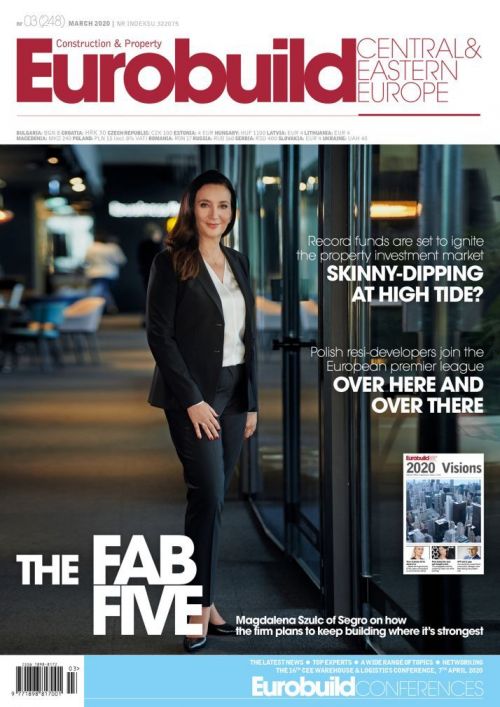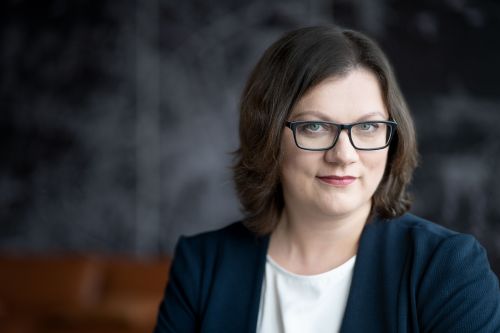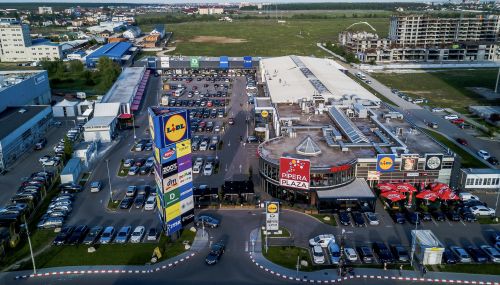Over here and over there
Investment & finance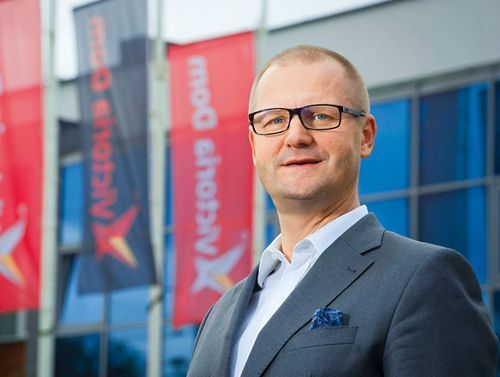
The deluge of acquisitions of Polish developers got underway in autumn 2019. Since then, every couple of weeks the media has been alerted to the launch of some takeover bid or another of a Polish developer by an international giant. This news has mostly been imparted to us in a dry, terse form, and often came to our editorial office in a roundabout way, sometimes even by accident. Any attempt to obtain an explanation or commentary was doomed to failure, which has been justified – in the unofficial conversations we’ve been having with those involved – by the huge penalties added to contracts for confidentiality breaches. However, the more advanced these takeovers have become, the more information has seeped into the media.
Secret takeovers
The floodgates seemed to finally creak open with the acquisition and division of Wroclaw-based company Vantage Development – a somewhat unusual transaction, as it concerned a local developer and was also quite extensively publicised. In early November 2019, ‘Eurobuild CEE’ informed its readers that German behemoth TAG Immobilien, a developer and owner of apartments for rent, had bought out 100 pct of Vantage for EUR 131 mln for its special purpose vehicle TAG Beteiligungs- und Immobilienverwaltungs. Since the German company was only interested in the residential business and the platform of the Wrocław-based developer, the commercial part of the company (including its office assets) was resold by TAG to existing Vantage shareholders – companies owned by Grzegorz Dzik and Józef Biegaj. Thus, TAG finally spent only EUR 85 mln on the acquisition of Vantage. “The Polish rental housing market is perfectly in tune with the strategic, operational and financial goals of TAG, and we will approach it with the same commitment and discipline as we do with our German projects,” insists Martin Thiel, the financial director of TAG Immobilien. “The new owner is one of the leaders on the rental market in Germany and intends to achieve a similar position in Poland. The company has more than 84,000 apartments for rent in Germany and its sudden entry into the Polish market should provide it with a competitive advantage and a strong position. According to a TAG press release, the medium-term goal for the next 3–5 years is 8,000–10,000 units, and Vantage Development is to be the launch-pad for the development of its portfolio in Poland,” adds Dariusz Pawlukowicz, a member of the board of Vantage Development [in his interview in this magazine – editor’s note]. A total of 48,561,706 shares were registered on the investment account of TAG Beteiligungs- und Immobilienverwaltungs in mid-January, when TAG became the sole shareholder of Vantage Development.
In the middle of last November more electrifying news emerged – with the announcement that Reino Capital and RF Corval are buying Kraków-based Buma group, which comprises more than 20 companies and assets worth app. PLN 1.3 bln gross. RF Corval is an Australian entity that invests in and manages real estate funds and has assets currently worth around USD 2 bln, while Reino Capital was set up by Polish fund Reino Partners. Reino Capital and RF Corval originally announced their intention to acquire an unidentified company in June 2019. A month later, the consortium signed a letter of intent regarding the takeover, which provided the buyer with exclusive negotiation rights for three months. Finally, the Office of Competition and Consumer Protection [UOKiK] received an application to take joint control over Buma’s companies and real estate, which was issued in the last few days of 2019. An almost complete news blackout has been imposed on the takeover – the parties on both sides of the deal are refusing to make any comment on it, which is a pity, since it would be interesting to find out why the transaction is not going smoothly: at the end of January, the consortium announced in a short communiqué that the signing of preliminary contracts for the purchase of Buma had been postponed by a month. The buyers then insisted that the contracts would be concluded by February 21st, 2020, and that the extension of the deadline was “down to objective factors, independent of the parties to the transaction, which do not pose any threat to its execution”. The final closing date for the deal has been set for May 21st.
In mid-December we happened to learn from a stock market announcement by Awbud (capitalisation of PLN 20 mln) that international fund AEREF V PL Investment had its eye on stock market listed Murapol. Awbud (which is controlled by Murapol) reported that the takeover request had been sent to UOKiK. After that, neither Awbud nor Murapol wanted to comment on the details of the ongoing deal. However, according to what we have since discovered, the buyer is to be a sub-fund owned by the pan-European Ares European Real Estate Fund V, which is managed by American investor Ares Management Corporation. At its closing, in August 2019, the fund had raised EUR 1.78 bln for investment. Murapol is one of the leading Polish residential developers – in 2019, by signing 3,674 apartment sales contracts and transferring 3,124 units to buyers, it improved its respective annual figures by 3 pct and 20.5 pct. In addition to this, in 2019 the developer put 4,448 residential units onto the market – 38.3 pct more than the previous year. On the last day of December 2019, Murapol had an active land bank worth almost PLN 589.5 mln for the construction of more than 17,700 housing units with app. 765,600 sqm of total usable space. “Last year was another successful period for the residential sector, while for us it was also a very good time in which we generated strong results across the board,” commented Nikodem Iskra, the CEO of Murapol. In mid-February it was finally announced that a joint venture between a fund managed by Ares Management Corporation and Griffin Real Estate had acquired a 98.04 pct stake in Murapol. The value of the deal has yet to be disclosed.
Just before Christmas 2019, Warsaw-based Polnord announced that it had entered into negotiations with Hungarian developer Cordia and was giving the company permission to carry out due diligence on it. Polnord has been operating on the construction and development market for several decades and has been listed on the Warsaw Stock Exchange for more than 20 years. It has not, however, had the best press of late, although a change in the CEO at the beginning of last year signalled that it was back on the right course. “I don’t want to talk about new strategies right now, but the acquisition will allow us to expand the company, spread its wings and realise the potential of its assets, most of which are plots in Miasteczko Wilanów in Warsaw and the Haffner project in Sopot – for which it already has a building permit,” Marcin Gomoła, the CEO of Polnord, told ‘Eurobuild CEE’, while informing us that UOKiK had granted consent for the planned takeover. In mid-February it was announced that Cordia had completed the purchase of 63.7 pct of Polnord’s shares for EUR 31.7 mln, giving it a controlling stake of above 65 pct.
Why such a flood of acquisitions? Why have Polish developers – which are very diverse in terms of scale of activity and strength – become such tasty morsels for international investors? Maximilian Mendel of JLL goes some way to explaining why: “Because the opportunities to buy large apartment packages or entire buildings are very limited in Poland, so investors have to turn to other models – such as forward funding and forward purchase deals, buying developers or establishing companies with a Polish partner,” he explains.
Increasingly long queue
It would be a wild exaggeration to claim that the Polish private rental sector has reached maturity, but this is why it seems interesting – it still provides high rates of return. “It’s true that we don’t have product on the scale we can see in mature markets, but homes in Western Europe no longer guarantee huge profits, which is why – in spite of everything – foreign investors are increasingly looking at the market in Poland and entering it more with more confidence,” believes Maximilian Mendel. In the 1990s, the former East Germany turned out to be a goldmine for investors, as up until then it had virtually no private or cooperative ownership, and most residential space belonged to large workplaces or municipalities – so the purchase of entire buildings or even housing estates was a relatively simple matter, as was managing them later. “But in Poland back then there was widespread privatisation: municipalities and workplaces sold their resources to tenants, homeowner associations were established – and this made it very difficult or even virtually impossible for investors or funds to buy this real estate, even in the few cases where a larger number of apartments for rent remained in the hands of a single owner,” explains Maximilian Mendel of JLL, “Western investors called these privatised buildings ‘Swiss cheese’ and hardly anyone wanted to invest in them. Even the purchase of a large batch of apartments in one building meant that the investor would be dependent on the grace of the homeowner association, and this greatly complicates the management process – especially with a large portfolio of apartments.”
A similar situation to that of eastern Germany in the 1990s could be seen in Czechoslovakia – where, however, the privatised stock of municipal and company apartments was very quickly taken over by private companies, which then sold the portfolios to foreign investors. The Residomo platform was created in the Czech Republic in this way. At the end of 2019, it already had more than 4,500 apartments in its portfolio, around a third of which are located in the Ostrava region, being the former housing stock of the local mines. In January, the entire portfolio was purchased by Swedish investment company Heimstaden Bostad for EUR 1.3 bln, which thus became the largest private owner of residential real estate in the Czech Republic. “Investors who are interested in the Polish market are always asking us: ’Where are these 10,000 apartments that are completed and rented? We‘d like to begin talks about buying them.’ However, there such portfolios simply don’t exist. There’s also no documented rental history, so it’s even more difficult to forecast tenants’ behaviour or renovation costs. Although investor interest is high, we’ll have to wait at least a few more years for transactions of this scale. Several investors are building their own resources in Poland, such as Resi4Rent or Golub GetHouse, and they will probably want to exit these investments after some time, but not with resources counted in tens of thousands of units,” predicts Maximilian Mendel.
Over the Oder
The movement across the Polish-German investment border, however, has not been taking place in just the one direction – Polish residential developers are also heading the other way, seeing opportunities for high margins calculated in euros on the currently booming German market. Murapol has been a pioneer in this respect, but the company actually took the plunge in a rather unorthodox way by buying two large plots in the Berlin region and selling both in 2018 for a large profit – a 1 ha site for the construction of an estate with 126 apartments bought two years earlier for EUR 1.45 mln was sold for EUR 6.2 mln, while a 2 ha plot in Zossen (for 15 buildings comprising 230 apartments) bought for EUR 3.1 mln changed hands for EUR 5.9 mln (all net amounts). The CEO of Murapol, Nikodem Iskra, now insists that, although the company is focused on the Polish market, he hasn’t abandoned plans for foreign expansion and has established Murager in Germany for the purpose of constantly searching for interesting land.
Atal, a giant on the housing markets of seven Polish conurbations, has also taken the plunge in Germany. According to the CEO of the company, expanding its range to another city would not contribute much to its business, whereas opening up to other, foreign markets is another matter – it’s much more of a growth path to take. “We’ve been analysing expanding our operations abroad for several years, looking at several European countries and carefully surveying the markets there. Eventually, we decided to make our international debut in Germany, where we already have a project with a building permit,” reveals Zbigniew Juroszek, the CEO of Atal. Mika, the multi-stage project being carried out by the company, involves the construction of premium apartments near Dresden’s old town. The first stage of the project comprises app. 15,000 sqm of useable and residential space and should be completed in 2021, with more than 800 apartments to be built on the estate within around five years. The estimated value of the project is to come to around EUR 50 mln, while 1 sqm of an apartment will cost app. EUR 4,000, from which the developer expects to achieve a gross margin of 20–22 pct. “We have analysed two alternative ways of operating on the German market. The first involved taking charge of the entire construction – starting with the purchase of the plot, to organising the construction project. However, we finally chose the other option – investing in a ready project that was already well-known on the local market. The German company we bought the project from is currently working on completing the first phase. We will be taking charge of the subsequent stages completely independently,” says Zbigniew Juroszek. To launch its operations on the German market, Atal founded a special purpose vehicle in Berlin called Atal GmbH. Its Dresden project is being carried out through this company. Atal is responsible for the organisation of each stage of the project, being the owner of the land and the general contractor. Furthermore, the construction will be supervised by Atal’s Poznań team of engineers while other staff from the company will be responsible for the sales.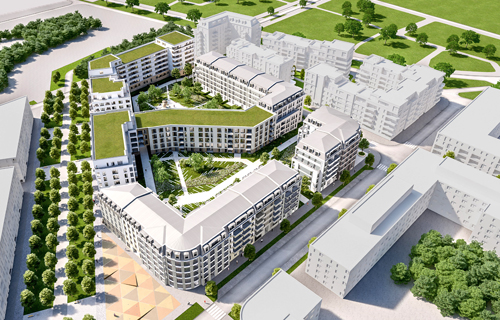
More than 800 apartments are to be built in a period of around five years on the Mika estate (top) in Dresden in a project valued at around EUR 250 mln
Victoria Dom, a Warsaw-based company that has up until now built only in the Warsaw area, has adopted a slightly different way of operating. It is now starting another residential project in Germany. “The idea to invest in Berlin was prompted by our desire to diversify our business, and also to reduce the impact of current or future regulations on the Polish market that could be unfavourable to our business,” explains Waldemar Wasiluk, a deputy CEO of Victoria Dom. The company took its first step in 2018 by selling a large residential project with more than 200 apartments in a structured transaction. The developer has since purchased a plot in Berlin where a project was already being carried out by a local general contractor. The property, worth around EUR 75 mln, also had an eventual buyer in place in the form of a German investment fund. “We played a significant part in this deal and gained our first experience in Germany. However, our latest projects, which we have prepared from the beginning, have a different character – we are selling the apartments on the market for new homes to individual buyers. Development cannot be done remotely, so to embark on foreign projects meant we had to build a new team and organise the entire process: the design, the execution and the sales... I can say that we have managed to do all this in the best possible way in terms of the costs and the organisation. We currently have eight special purpose vehicles in Berlin and four projects at various stages of development,” reveals Waldemar Wasiluk.
The first of these should be ready in the spring. All the apartments in this estate, which has around 1,800 sqm of useable and residential area, are already sold, earning the developer around EUR 11 mln. Two more projects that are about to start have already had around 50 pct and 20 pct of their apartments pre-sold. “This year we are also starting our fourth and largest project in Berlin so far and aiming for sales worth app. EUR 40 mln within half a year. We are also looking for more opportunities in Germany, not only in Berlin. This year we expect to acquire at least three new sites. Our plan is to eventually have sales worth around EUR 50–100 mln a year in Germany,” reveals the CEO of Victoria Dom.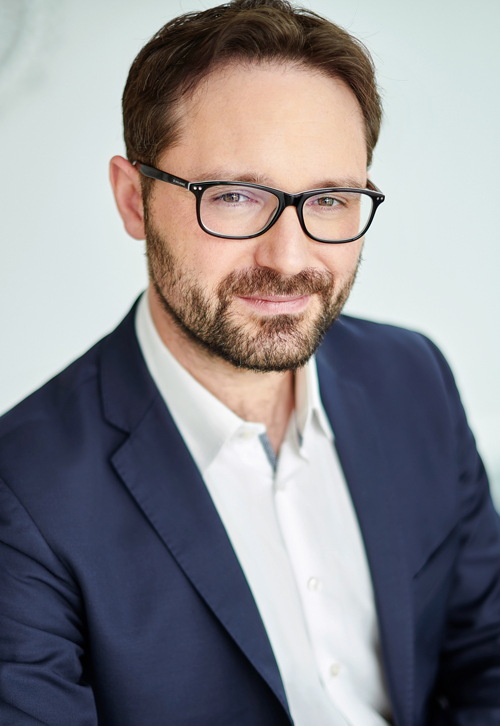
“Where are these 10,000 apartments that have been completed and rented? We‘d like to begin talks about buying them, people ask me – but such portfolios simply don’t exist,” admits Maximilian Mendel of JLL
(Almost) anyone can make money
How is the German market different from Poland and what kind of companies have a chance to succeed on it? “The recipe for success in Germany is simple – three-times the quality. It’s an absorbent market that’s booming – like ours – but only quality projects are acceptable to buyers there,” says Marcin Gomoła, the CEO of Polnord, who has been active on the German market for many years. The analogy he gives is that of the German automotive market – cars from Germany are not cheap but their quality, performance and durability is impossible to counterfeit, so they are more eagerly snapped up by buyers.
“A strategy of ‘cramming in useable and residential space’ and squeezing margins out of every square centimetre will certainly not work on the residential market there. However, Polish developers have the chance to generate very high margins provided they can maintain ‘Polish costs’, mainly in terms of their personnel” argues Marcin Gomoła.
“The project in Dresden is our first on a foreign market, so we had to spend a great deal of time analysing the potential risks, to identify the difficulties we might encounter. However, it turned out that in Germany, certain things turned out to be actually easier than in Poland,” insists Zbigniew Juroszek of Atal. “Preparing a project is more predictable and reliable. German cities are, for example, much more enterprise-friendly, they appoint officials to supervise an investment at every stage and help with formal issues,” he adds.
When investing in German cities, you need to be patient and plan the investment much more in advance – according to developers, the issuing of a building permit itself takes 6–9 months.
“You might also miss working in the Polish office because German ones are definitely more bureaucratic. However, access to archived information is easier because German land registers and archives have been kept since the 19th century,” remarks Waldemar Wasiluk of Victoria House. “The biggest challenge with investing in German cities is the lack of land – if you compare this with the situation in Warsaw, you will see that the Polish capital has huge, empty spaces that are just waiting for developers. Due to the strict environmental standards, a lot of time and money are also absorbed by the remediation of German land – virtually every plot in Berlin requires decontamination and the removal of the topsoil,” admits the head of Victoria Dom.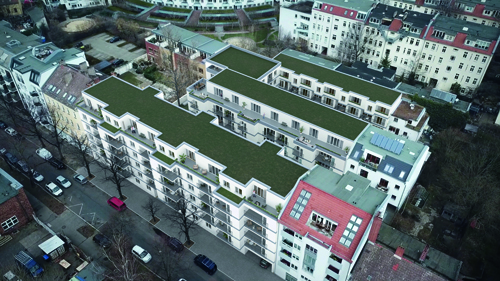
Victoria Dom currently has four projects in Berlin under development, including one on Charlottenburger
It’s also worth pointing out a significant difference when it comes to the most popular units – apartments in Germany are much more spacious than in Poland: two-room units are on average 55–60 sqm (compared to 40 sqm in Poland), while three-room apartments have an average of 80 sqm, and four-room apartments are generally around 100 sqm. Despite these substantial differences, Maximilian Mendel of JLL insists that even Polish developers that have yet to enter the German market would find that there are many advantages in working there. “First of all, they are able to reduce the construction costs if they import employees from Poland. Secondly, even if they have to pay for their inexperience by spending more on land and settling for slightly lower margins, these would still be margins in euros – lower in terms of the percentage but higher in terms of the amount in złoty. Furthermore, it’s worth adding that there are virtually no large housing developers on the German market – generally they are small and medium-sized local companies and it’s relatively easy to compete with them on local markets,” he insists.
And there’s one final resource that Polish players have: chutzpah – Polish business people have risk-taking in their DNA and are willing to take on difficult projects that no German company would ever even consider.
Dariusz Pawlukowicz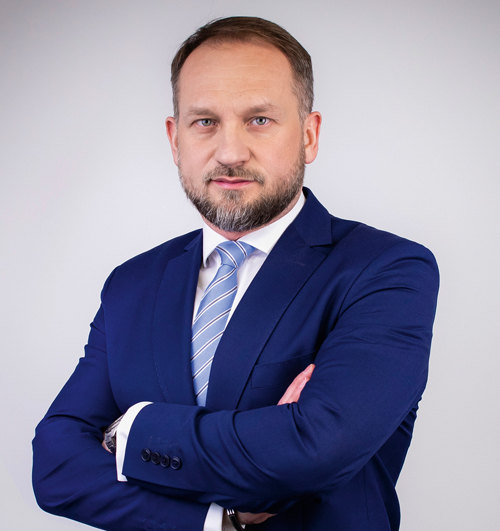
a member of the board of Vantage Development
There’s more to life than Wrocław
How much time did it take to secure a strategic investor?
Exactly a year, almost to the day. When our main shareholder started reviewing the strategic options, Vantage Development’s team was fully aware that this could mean many new challenges for us in the future. We now know that the company’s activities will change, internally and externally.
What kind of changes will they be?
One of the main terms of the transaction was the separation from this group of Vantage’s commercial companies, which remained in the hands of its existing shareholders. In the past, we have also developed office projects as well as residential projects. From now on we will focus mainly on residential except when the construction of commercial space is justified by the concept for the project.
What are TAG’s plans for the Polish market?
TAG Immobilien is one of the leaders on the rental market in Germany and intends to achieve a similar position in Poland. The company has more than 84,000 apartments for rent in Germany and its recent entry into Poland will give the company a competitive advantage and a strong position. The medium-term goal for the next 3–5 years is 8,000–10,000 units, and Vantage Development is to be the launch-pad for its development in Poland.
But Wrocław won’t be enough for such ambitious plans…
We’ve completed three projects in Warsaw but – in fact – Wrocław has been our most important location for years. Of course, such an ambitious plan involves expanding into other markets, which is already underway – in Poznań we’ve recently bought land on ul. Dożynkowa, ul. Piątkowska, ul. Brneńska and ul. Wagrowska. As an academic centre with a growing population and a well-developed infrastructure, this city is an ideal place for Vantage Development to operate in. Our strategy is to build apartments for rent, some of which, being close to the University of Life Sciences, are to be specifically for students. In general, TAG Immobilien is mainly interested in large cities with academic centres.
However, the rental market is no longer such virgin territory in Poland – many active players already operate on it...
In spite of that, renting from individuals is common in our country. The institutional rental market is still in its infancy, although analysts insist that this is a promising sector if we look at the residential needs of Poles as well as the social and demographic changes. The largest player is Fundusz Mieszkań na Wynajem [the Apartments for Rent Fund] with app. 1,900 units on offer in several cities in Poland. The fund’s business model has so far been to contract developers for projects, but this year it was announced that – after some unresolved tenders – it would be taking on the construction of a Warsaw project itself. Our advantage lies in the fact that we have almost 13 years of experience in this field and an effective professional team. However, we are not the only developer that has entered the rental market. Resi4Rent is currently building 1,200 apartments and is preparing the development of another 1,700. I think we can expect to see clear growth on the institutional rental market over the next few years.
Does the takeover by TAG mean that Vantage is to completely abandoning the classic development business?
The preliminary agreement to acquire a 100 pct stake in Vantage Development was signed in November 2019 and finalised in January, so we have only had a few months to process and plan our most important activities for this year. The company’s new strategy is still under preparation; however, our initial sales target for this year is 500 units. Over the next twelve months, we plan to start projects with around 1,300 apartments for rent, but the units we launched last year remain on sale. We will certainly complete the residential projects that we have already started in Wrocław, but we are not planning to launch any more commercial projects, except for an office building in Port Popowice in Wrocław.
What are the biggest challenges facing the development sector in 2020?
We can certainly expect further price increases, although not as big as before. These will be due to restrictions on access to attractive plots on the one hand and rising construction costs on the other. It’s debatable whether there will actually be a decline in the number of qualified construction workers from the East after the German border opens up to them in January – as many analysts predict. But there will still be the language barrier, higher living costs and the need to live far from home, which may encourage a significant proportion of such workers to stay in Poland. We also hope that the further increases in wages expected by the Polish national bank will continue to stimulate demand on the residential market, and the prices set by the sector will remain acceptable to buyers. Further stabilisation seems to be the most likely scenario for the development sector. On the other hand, the actions of the government, which has been planning to introduce amendments to the development act for some time, are causing some disruption and having a destabilising effect on the entire sector. The regulations that came into force in 2012 improved the professionalisation of the sector and provided buyers with greater security through open escrow accounts. UOKiK, however, is pushing for the introduction of a developer guarantee fund, which will have little impact on the actual security of the transaction and will only contribute to a further increase in housing prices.
























